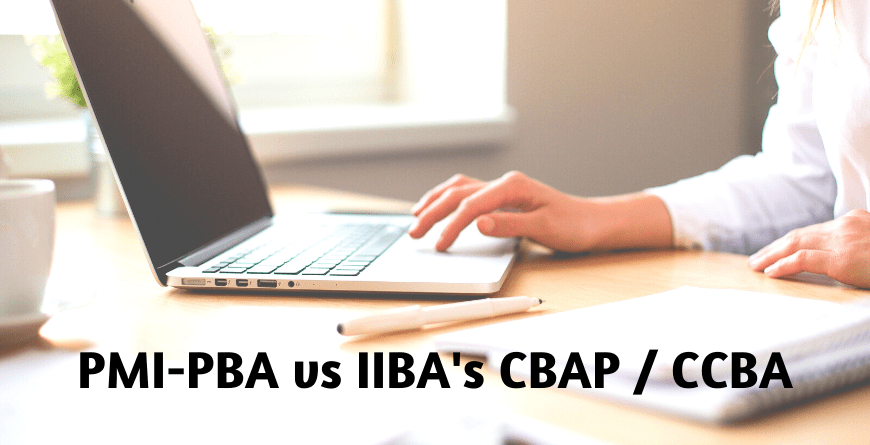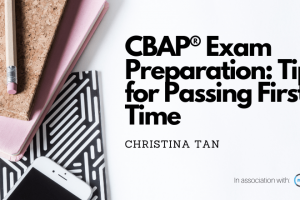
The PMI-PBA vs. IIBA’s CBAP / CCBA
Differences between PMI-PBA and IIBA’s CBAP / CCBA
In this article, you’ll learn about a few of the differences between the PMI and IIBA certifications, why the PMI-PBA is good for business analysis, and then I’ll offer up some criteria you might use to choose the right certification as part of your near-term professional development goals.
Project Management Institute (PMI)-PBA Certification
The PMI-PBA is explicitly for business analysts who work on projects and programs, as well as project and program managers who perform business analysis as part of their role. According to PMI, the certification spotlights your ability to work effectively with stakeholders related to project or business requirements, and ensure projects drive successful business outcomes.
To obtain a PMI-PBA certification, first you need to complete an application that verifies you meet the following requirements:
- Minimum of 3 years (4,500 hours) of business analysis experience within the past 8 consecutive years if you have a bachelor’s degree. (Or 5 years/7500 hours of experience if you do not.) (For comparison, the CBAP® requires 7,500 hours of experience and the CCBA® 3,750.)
- 2,000 hours working on project teams within the past eight consecutive years.
- 35 business analysis education (contact hours). PMI-PBA Training Minimum of 3 years (4,500 hours) of business analysis experience within the past 8 consecutive years if you have a bachelor’s degree. (Or 5 years/7500 hours of experience if you do not.) (For comparison, the CBAP® requires 7,500 hours of experience and the CCBA® 3,750.)
- 2,000 hours working on project teams within the past eight consecutive years.
- 35 business analysis education (contact hours).
Then, you must pass the PMI-PBA exam covers the following material:
- Needs Assessment (18%)
- Planning (22%)
- Analysis (35%)
- Traceability and Monitoring (15%)
- Evaluation (10%)
International Institute of Business Analysis (IIBA)
In contrast, IIBA® does not confine business analysis to projects or programs. In fact, IIBA® explicitly defines a collection of business analysis activities that transcend the project and are applicable to all types of organizational improvement. And, at its best, business analysts should be routinely involved to evaluate opportunities before projects are even approved – or before a project manager has even been assigned. IIBA offers two certifications to make you an expert in the field of Business Analysis. They are
- CBAP Certification
- CCBA Certification
CBAP Certification
The Certified Business Analysis Professional (CBAP) designation is a professional certification from International Institute of Business Analysis (IIBA) for individuals with extensive business analysis experience. CBAP certification acknowledges intermediate to senior business analysts with 5+ years of expertise who can also lead Business Analysts. CBAPs are the recognized experts in the BA field. Candidates should meet the eligibility necessities, together with passing a rigorous exam, to earn the CBAP certification.
Eligibility to Apply for CBAP Certification
- Needs 7500 hours of Business Analysis experience in the last 8 years.
- Within this 7500 hours, a minimum of 900 hours must be spent in atleast 4 of the 6 core areas in the BABOK guide v3.
- 35 PD (Professional Development) hours must be earned in the last 4 years.
CCBA Certification
CCBA (Certificate of Capability in Business Analysis) certification is offered by IIBA. If you have 2 to 3 years of experience in the field of Business Analysis, this certification is right for you. CCBA certification provides you the ability to handle larger or complex project responsibilities, also it provides you the formal recognition in the field of Business Analysis.
Eligibility to Apply for CCBA Certification
- Minimum 3750 hours of business analysis work experience with BABOK Guide knowledge in the last 7 years.
- Minimum 900 hours in each of 2 of the 6 knowledge areas or 500 hours in each of 4 of the 6 knowledge areas in the BABOK guide v3.
- 21 PD (Professional Development) hours are required within the last 4 years.
Of course, the PMI view of business analysis is what more commonly in place at today’s organizations. However, the IIBA view gives us something to strive for as we seek out senior business analyst opportunities and grow our careers generally.
Is the PMI-PBA or IIBA® CBAP® or CCBA® right for you?
As a professional with limited time and resources, you might be wondering whether you should choose the PMI-PBA instead of the IIBA® CBAP® or CCBA®. While it’s way too early to know for sure how each certification will impact your job prospects and career aspirations, here are some criteria you can use to decide what is in your best interest in the short term.
- If you are in a project-focused business analyst role right now, and happy to stay there, and your organization is engaged with PMI, the PMI-PBA could be a really good option to gain more internal credibility.
- If you are in a project-focused business analyst role, but discontent and want a bigger seat at the table (or a seat at all), look to the CBAP. As a by-product of the certification process, you’ll expand your view of your own capabilities and discover ways to add even more value to your organization.
- If your organization already supports the CBAP / CCBA route or your certification process is underway, stay the course. You can always pick up the PMI-PBA later.
- If you are targeting project-focused business analyst roles, either the PMI-PBA or IIBA CBAP / CCBA could help set you slightly ahead of the pack when it comes to your business analysis job search. It’s too soon to tell if the PMI-PBA is going to significantly outstrip the CBAP or CCBA from the perspective of employers hiring business analysts.
- The Needs Assessment in the PMI-PBA outline is much more limited in scope than the Enterprise Analysis Knowledge area of “A Guide to the Business Analysis Body of Knowledge (BABOK Guide),” which includes many additional tasks to proactively determine the business needs, current capabilities, and define the business case, rather than to merely review and refine the existing business case or meet with stakeholders to understand their needs.
- In the PMI-PBA outline, Elicitation is wrapped up inside the Analysis knowledge area, rather than being a discrete Knowledge Area that applies to a wide-variety of different business analysis activities.
- The Planning task as defined by the PMI-PBA outline is confined to the Requirements Management space, rather than the broader view offered by the BABOK Guide in the Business Analysis Planning & Monitoring Knowledge area. The IIBA BABOK Guide gives business analysts a role in identifying the best possible techniques, activities, and approach to the entire business analysis effort.
- One area that the PMI definition is broader in scope is that the Evaluation tasks cover some elements of Quality Assurance, whereas the BABOK® Guide specifically limits the business analyst role in this matter.
Why Both IIBA and PMI certification Options are good for Business Analysts?
Even with a more limited view of the business analyst role, PMI’s decision to enter this space is a sign of many positive things to come for business analysts.
With the strength of PMI behind the business analyst role, I think we will see wider adoption of business analysis, as a discrete role from project management, on more and more projects. Through the new practice guide and PMI-PBA certification, PMI will drive an awareness of the Business role globally that IIBA has simply not had the resources to do. This is a good thing as it means more jobs, even higher business analyst salaries, and less time spent selling our value.
However, it doesn’t seem as if PMI will define and promote the next generation of business analysts – the type of opportunities that excite me about being a business analyst and that make it an attractive profession for senior-level professionals looking for leadership opportunities. We need the IIBA for that. This work is much more challenging and the path to success will necessarily be slower. IIBA will need our support, strength, and resources to lead the charge on our behalf and keep it going even as the number of PBA credential holders quickly surpasses the number of CBAP and CCBA Recipients.
To learn more about Business Analysis, select from a list of online Business Analyst training courses.
Tag:BA Certification, BA Certifications, Business Analysis Certifications, differences between PMI-PBA and IIBA CBAP / CCBA, eligibility to apply for CBAP certification, eligibility to apply for CCBA certification, Eligibility to apply for PMI-PBA certification, IIBA CBAP CERTIFICATION, IIBA CCBA CERTIFICATION, pmi pba certification', PMI-PBA Training, PMI-PBA vs IIBA CBAP / CCBA, what is CBAP?, what is CCBA?, what is pmi-pba certification?, who can apply for CBAP?, who can apply for CCBA?, Who can apply PMI-PBA Certification exam



